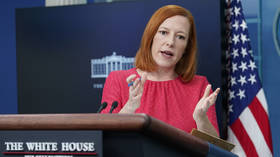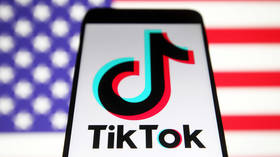Influencer says White House used TikTok stars as ‘pawns’

TikTok celebrity and self-described “Gen Z Historian” Khalil Greene has criticized his fellow influencers for telling their fans “verbatim” what the Biden administration wanted them to say on the Ukraine conflict. Greene said that he understands why conservatives said that the young influencers were “used as pawns by the White House.”
Greene was one of 30 social media creators invited to a video conference by the White House last month, during which Press Secretary Jen Psaki laid out the US’ policy on Ukraine and Russia, so that the message could then be spread to their millions of followers. The White House’s director of digital strategy, Rob Flaherty, said that the virtual briefing was “critically important” to make sure that the influencers got “the latest information from an authoritative source.”
However, Greene told Newsweek that he was left unimpressed. He said this week that Psaki started out by describing Russia’s offensive against Ukraine as “the biggest invasion since World War Two,” and explained that the conflict would have “global consequences that will affect everyone in the United States.”
“I feel like had they stopped there, I would have appreciated it more,” Greene told the news outlet. “But then they started to add more to the answer that made me more skeptical and more uneasy. There were a few red herrings that made it seem like giving more attention and support to other crises was beyond their capacity. There was also a general lack of acknowledgement of the US government's role in perpetuating other geopolitical issues.”
Greene, who typically posts videos about black history and activism in the US, said that he presented the information Psaki gave him “as what the White House would say,” rather than his own opinion.
Other content creators did not. Eighteen-year-old Ellie Zeiler, who has 10.5 million followers, said after the briefing that her role was to “relay the information in a more digestible manner to my followers.” She then told her followers that Russian Vladimir Putin had caused record high gas prices in the US, a line that the Biden administration has attempted to push despite the fact that gas prices have been climbing since Biden took office more than a year ago.
Greene steered away from criticizing Zeiler, but condemned another TikTok influencer, Marcus DiPaola, for “sharing what the White House said directly, without criticism or opinions.”
“When I saw a lot of the conservative fallout from the event, saying that people were being used as pawns by the White House, it was hard to argue against that,” he told Newsweek, describing how “the information being repeated about the session is just what we were told verbatim, without criticism.”
Greene was not the only influencer critical of the briefing. “The energy of the call felt like a press briefing for kindergartners,” said Jules Suzdaltsev, a Ukrainian-born journalist who also operates a popular TikTok channel. The officials had dodged hard questions, he added.
Aside from spoonfeeding information to TikTok influencers, the White House and the US intelligence agencies have also used leaks to the mainstream media to further their objectives regarding Ukraine. In an NBC News article published this week, US intelligence officials boasted that they fed fabricated and “low confidence” information to the press in a bid to win an “info war” against the Kremlin.













